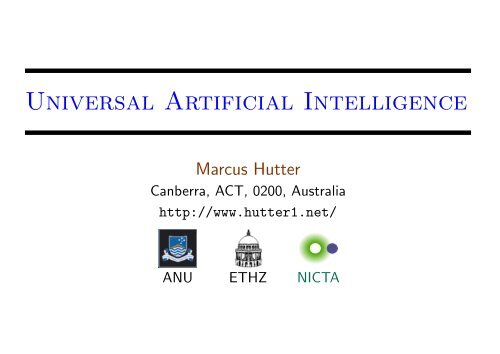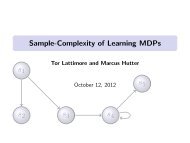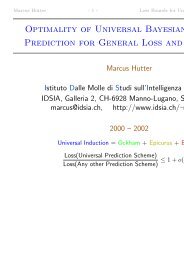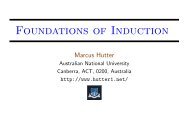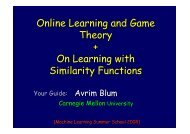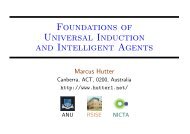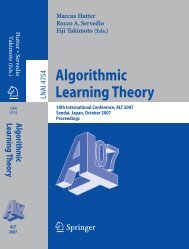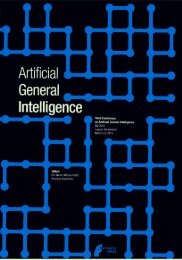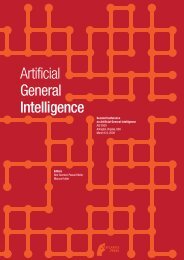Universal Artificial Intelligence - of Marcus Hutter
Universal Artificial Intelligence - of Marcus Hutter
Universal Artificial Intelligence - of Marcus Hutter
You also want an ePaper? Increase the reach of your titles
YUMPU automatically turns print PDFs into web optimized ePapers that Google loves.
<strong>Universal</strong> <strong>Artificial</strong> <strong>Intelligence</strong><br />
<strong>Marcus</strong> <strong>Hutter</strong><br />
Canberra, ACT, 0200, Australia<br />
http://www.hutter1.net/<br />
ANU ETHZ NICTA
<strong>Marcus</strong> <strong>Hutter</strong> - 2 - <strong>Universal</strong> <strong>Artificial</strong> <strong>Intelligence</strong><br />
Abstract<br />
The dream <strong>of</strong> creating artificial devices that reach or outperform human<br />
intelligence is many centuries old. In this talk I present an elegant<br />
parameter-free theory <strong>of</strong> an optimal reinforcement learning agent<br />
embedded in an arbitrary unknown environment that possesses<br />
essentially all aspects <strong>of</strong> rational intelligence. The theory reduces all<br />
conceptual AI problems to pure computational questions. The necessary<br />
and sufficient ingredients are Bayesian probability theory; algorithmic<br />
information theory; universal Turing machines; the agent framework;<br />
sequential decision theory; and reinforcement learning, which are all<br />
important subjects in their own right. I also present some recent<br />
approximations, implementations, and applications <strong>of</strong> this modern<br />
top-down approach to AI.
<strong>Marcus</strong> <strong>Hutter</strong> - 3 - <strong>Universal</strong> <strong>Artificial</strong> <strong>Intelligence</strong><br />
Overview<br />
Goal: Construct a single universal agent<br />
that learns to act optimally in any environment.<br />
State <strong>of</strong> the art: Formal (mathematical, non-comp.) definition<br />
<strong>of</strong> such an agent.<br />
Accomplishment: Well-defines AI. Formalizes rational intelligence.<br />
Formal “solution” <strong>of</strong> the AI problem in the sense <strong>of</strong> ...<br />
=⇒ Reduces the conceptional AI problem<br />
to a (pure) computational problem.<br />
Evidence: Mathematical optimality pro<strong>of</strong>s<br />
and some experimental results.
<strong>Marcus</strong> <strong>Hutter</strong> - 4 - <strong>Universal</strong> <strong>Artificial</strong> <strong>Intelligence</strong><br />
Contents<br />
• Philosophical and Mathematical Background.<br />
• <strong>Universal</strong> <strong>Intelligence</strong> Measure.<br />
• The Ultimate <strong>Intelligence</strong>. The AIXI Agent.<br />
• Human Knowledge Compression Contest.<br />
• Conclusions and References.
<strong>Marcus</strong> <strong>Hutter</strong> - 5 - <strong>Universal</strong> <strong>Artificial</strong> <strong>Intelligence</strong><br />
PHILOSOPHICAL AND<br />
MATHEMATICAL BACKGROUND
<strong>Marcus</strong> <strong>Hutter</strong> - 6 - <strong>Universal</strong> <strong>Artificial</strong> <strong>Intelligence</strong><br />
What is (<strong>Artificial</strong>) <strong>Intelligence</strong>?<br />
<strong>Intelligence</strong> can have many faces ⇒ formal definition difficult<br />
• reasoning<br />
• creativity<br />
• association<br />
• generalization<br />
• pattern recognition<br />
• problem solving<br />
• memorization<br />
• planning<br />
• achieving goals<br />
• learning<br />
• optimization<br />
• self-preservation<br />
• vision<br />
• language processing<br />
• classification<br />
• induction<br />
• deduction<br />
• ...<br />
What is AI? Thinking Acting<br />
humanly Cognitive Turing test,<br />
Science Behaviorism<br />
rationally Laws Doing the<br />
Thought Right Thing<br />
Collection <strong>of</strong> 70+ Defs <strong>of</strong> <strong>Intelligence</strong><br />
http://www.vetta.org/<br />
definitions-<strong>of</strong>-intelligence/<br />
Real world is nasty: partially unobservable,<br />
uncertain, unknown, non-ergodic, reactive,<br />
vast, but luckily structured, ...
<strong>Marcus</strong> <strong>Hutter</strong> - 7 - <strong>Universal</strong> <strong>Artificial</strong> <strong>Intelligence</strong><br />
Relevant Research Fields<br />
(<strong>Universal</strong>) <strong>Artificial</strong> <strong>Intelligence</strong> has interconnections with<br />
(draws from and contributes to) many research fields:<br />
• computer science (artificial intelligence, machine learning),<br />
• engineering (information theory, adaptive control),<br />
• economics (rational agents, game theory),<br />
• mathematics (statistics, probability),<br />
• psychology (behaviorism, motivation, incentives),<br />
• philosophy (reasoning, induction, knowledge).
<strong>Marcus</strong> <strong>Hutter</strong> - 8 - <strong>Universal</strong> <strong>Artificial</strong> <strong>Intelligence</strong><br />
Relation�between�ML�&�RL�&�(U)AI�<br />
Statistical<br />
Machine Learning<br />
<strong>Universal</strong> <strong>Artificial</strong> <strong>Intelligence</strong><br />
Covers all Reinforcement Learning problem types<br />
Mostly i.i.d. data<br />
classification,<br />
regression,<br />
clustering<br />
RL Problems<br />
& Algorithms<br />
Stochastic,<br />
unknown,<br />
non-i.i.d.<br />
environments<br />
<strong>Artificial</strong><br />
<strong>Intelligence</strong><br />
Traditionally<br />
deterministic,<br />
known world /<br />
planning problem
<strong>Marcus</strong> <strong>Hutter</strong> - 9 - <strong>Universal</strong> <strong>Artificial</strong> <strong>Intelligence</strong><br />
Informal Definition <strong>of</strong> (<strong>Artificial</strong>) <strong>Intelligence</strong><br />
<strong>Intelligence</strong> measures an agent’s ability to achieve goals<br />
in a wide range <strong>of</strong> environments. [S. Legg and M. <strong>Hutter</strong>]<br />
Emergent: Features such as the ability to learn and adapt, or to<br />
understand, are implicit in the above definition as these capacities<br />
enable an agent to succeed in a wide range <strong>of</strong> environments.<br />
The science <strong>of</strong> <strong>Artificial</strong> <strong>Intelligence</strong> is concerned with the construction<br />
<strong>of</strong> intelligent systems/artifacts/agents and their analysis.<br />
What next? Substantiate all terms above: agent, ability, utility, goal,<br />
success, learn, adapt, environment, ...<br />
Never trust a theory if it is not supported by an experiment<br />
=== =====<br />
experiment theory
<strong>Marcus</strong> <strong>Hutter</strong> - 10 - <strong>Universal</strong> <strong>Artificial</strong> <strong>Intelligence</strong><br />
Induction→Prediction→Decision→Action<br />
Having or acquiring or learning or inducing a model <strong>of</strong> the environment<br />
an agent interacts with allows the agent to make predictions and utilize<br />
them in its decision process <strong>of</strong> finding a good next action.<br />
Induction infers general models from specific observations/facts/data,<br />
usually exhibiting regularities or properties or relations in the latter.<br />
Example<br />
Induction: Find a model <strong>of</strong> the world economy.<br />
Prediction: Use the model for predicting the future stock market.<br />
Decision: Decide whether to invest assets in stocks or bonds.<br />
Action: Trading large quantities <strong>of</strong> stocks influences the market.
Foundations <strong>of</strong> <strong>Universal</strong> <strong>Artificial</strong> <strong>Intelligence</strong><br />
Ockhams’ razor (simplicity) principle<br />
Entities should not be multiplied beyond necessity.<br />
Epicurus’ principle <strong>of</strong> multiple explanations<br />
If more than one theory is consistent with the observations, keep all theories.<br />
Bayes’ rule for conditional probabilities<br />
Given the prior belief/probability one can predict all future probabilities.<br />
Posterior(H|D) ∝ Likelihood(D|H) × Prior(H).<br />
Turing’s universal machine<br />
Everything computable by a human using a fixed procedure can also be computed<br />
by a (universal) Turing machine.<br />
Kolmogorov’s complexity<br />
The complexity or information content <strong>of</strong> an object is the length <strong>of</strong> its shortest<br />
description on a universal Turing machine.<br />
Solomon<strong>of</strong>f’s universal prior=Ockham+Epicurus+Bayes+Turing<br />
Solves the question <strong>of</strong> how to choose the prior if nothing is known. ⇒<br />
universal induction, formal Ockham. Prior(H) = 2 −Kolmogorov(H)<br />
Bellman equations<br />
Theory <strong>of</strong> how to optimally plan and act in known environments.<br />
Solomon<strong>of</strong>f + Bellman = <strong>Universal</strong> <strong>Artificial</strong> <strong>Intelligence</strong>.
<strong>Marcus</strong> <strong>Hutter</strong> - 12 - <strong>Universal</strong> <strong>Artificial</strong> <strong>Intelligence</strong><br />
UNIVERSAL INTELLIGENCE MEASURE
<strong>Marcus</strong> <strong>Hutter</strong> - 13 - <strong>Universal</strong> <strong>Artificial</strong> <strong>Intelligence</strong><br />
Agent Model<br />
with Reward<br />
Most if not all AI problems can be<br />
formulated within the agent<br />
framework<br />
r1 | o1 r2 | o2 r3 | o3 r4 | o4 r5 | o5 r6 | o6 ...<br />
work<br />
✟<br />
✟ ❍❨ ❍<br />
✟<br />
✟<br />
❍<br />
✟✙<br />
❍<br />
❍<br />
Agent<br />
p<br />
tape ... work Environment<br />
q<br />
✏✏✏✏✏✏✏✶ �������� tape ...<br />
a1 a2 a3 a4 a5 a6 ...
<strong>Marcus</strong> <strong>Hutter</strong> - 14 - <strong>Universal</strong> <strong>Artificial</strong> <strong>Intelligence</strong><br />
Formal Definition <strong>of</strong> <strong>Intelligence</strong><br />
• Agent follows policy π : (A×O×R) ∗ ❀ A<br />
• Environment reacts with µ : (A×O×R) ∗ ×A ❀ O×R<br />
• Performance <strong>of</strong> agent π in environment µ<br />
= expected cumulative reward = V π µ := Eµ[ ∑ ∞<br />
t=1 rπµ<br />
t ]<br />
• True environment µ unknown<br />
⇒ average over wide range <strong>of</strong> environments<br />
• Ockham+Epicurus: Weigh each environment with its<br />
Kolmogorov complexity K(µ) := minp{length(p) : U(p) = µ}<br />
• <strong>Universal</strong> intelligence <strong>of</strong> agent π is Υ(π) := ∑<br />
µ 2−K(µ) V π µ .<br />
• Compare to our informal definition: <strong>Intelligence</strong> measures an<br />
agent’s ability to perform well in a wide range <strong>of</strong> environments.<br />
• AIXI = arg maxπ Υ(π) = most intelligent agent.
<strong>Marcus</strong> <strong>Hutter</strong> - 15 - <strong>Universal</strong> <strong>Artificial</strong> <strong>Intelligence</strong><br />
Is <strong>Universal</strong> <strong>Intelligence</strong> Υ any Good?<br />
• Captures our informal definition <strong>of</strong> intelligence.<br />
• Incorporates Occam’s razor.<br />
• Very general: No restriction on internal working <strong>of</strong> agent.<br />
• Correctly orders simple adaptive agents.<br />
• Agents with high Υ like AIXI are extremely powerful.<br />
• Υ spans from very low intelligence up to ultra-high intelligence.<br />
• Practically meaningful: High Υ = practically useful.<br />
• Non-anthropocentric: based on information & computation theory.<br />
(unlike Turing test which measures humanness rather than int.)<br />
• Simple and intuitive formal definition: does not rely on equally hard<br />
notions such as creativity, understanding, wisdom, consciousness.<br />
Υ is valid, informative, wide range, general, dynamic, unbiased,<br />
fundamental, formal, objective, fully defined, universal.
<strong>Marcus</strong> <strong>Hutter</strong> - 16 - <strong>Universal</strong> <strong>Artificial</strong> <strong>Intelligence</strong><br />
THE ULTIMATE INTELLIGENCE:<br />
THE AIXI AGENT
<strong>Marcus</strong> <strong>Hutter</strong> - 17 - <strong>Universal</strong> <strong>Artificial</strong> <strong>Intelligence</strong><br />
The AIXI Model in one Line<br />
complete & essentially unique & limit-computable<br />
∑ ∑<br />
AIXI: ak := arg max ... max [rk + ... + rm]<br />
ak<br />
am<br />
∑<br />
2 −length(p)<br />
okrk<br />
omrm<br />
p : U(p,a1..am)=o1r1..omrm<br />
k=now, action, observation, reward, <strong>Universal</strong> TM, program, m=lifespan<br />
AIXI is an elegant mathematical theory <strong>of</strong> general AI,<br />
but incomputable, so needs to be approximated in practice.<br />
Claim: AIXI is the most intelligent environmental independent, i.e.<br />
universally optimal, agent possible.<br />
Pro<strong>of</strong>: For formalizations, quantifications, and pro<strong>of</strong>s, see [Hut05].<br />
Potential Applications: Agents, Games, Optimization, Active Learning,<br />
Adaptive Control, Robots.
<strong>Marcus</strong> <strong>Hutter</strong> - 18 - <strong>Universal</strong> <strong>Artificial</strong> <strong>Intelligence</strong><br />
Normalised Average Reward per Cycle<br />
1<br />
0.8<br />
0.6<br />
0.4<br />
0.2<br />
0<br />
Monte-Carlo AIXI Applications<br />
[VNHUS’09-11]<br />
Experience<br />
Optimal<br />
Cheese Maze<br />
Tiger<br />
4x4 Grid<br />
TicTacToe<br />
Biased RPS<br />
Kuhn Poker<br />
Pacman<br />
100 1000 10000 100000 1000000
<strong>Marcus</strong> <strong>Hutter</strong> - 19 - <strong>Universal</strong> <strong>Artificial</strong> <strong>Intelligence</strong><br />
Aspects <strong>of</strong> <strong>Intelligence</strong><br />
are all(?) either directly included in AIXI or are emergent<br />
Trait <strong>of</strong> Intell. How included in AIXI<br />
reasoning to improve internal algorithms (emergent)<br />
creativity exploration bonus, randomization, ...<br />
association for co-compression <strong>of</strong> similar observations<br />
generalization for compression <strong>of</strong> regularities<br />
pattern recognition in perceptions for compression<br />
problem solving how to get more reward<br />
memorization storing historic perceptions<br />
planning searching the expectimax tree<br />
achieving goals by optimal sequential decisions<br />
learning Bayes-mixture and belief update<br />
optimization compression and expectimax<br />
self-preservation by coupling reward to robot components<br />
vision observation=camera image (emergent)<br />
language observation/action = audio-signal (emergent)<br />
motor skills action = movement (emergent)<br />
classification by compression<br />
induction <strong>Universal</strong> Bayesian posterior (Ockham’s razor)<br />
deduction Correctness pro<strong>of</strong>s in AIXItl
<strong>Marcus</strong> <strong>Hutter</strong> - 20 - <strong>Universal</strong> <strong>Artificial</strong> <strong>Intelligence</strong><br />
Some Social Questions<br />
• Robot in human society: reward the robot according to how well it<br />
solves the tasks we want it to do, like raising and safeguarding a<br />
child. In the attempt to maximize reward, the robot will also<br />
maintain itself.<br />
• Robot w/o human interaction (e.g. on Alpha-Centauri):<br />
Some rudimentary capabilities (which may not be that rudimentary<br />
at all) are needed to allow the robot to at least survive.<br />
Train the robot first in safe environment, then it let loose.<br />
• Drugs (hacking the reward system):<br />
No, since long-term reward would be small (death).<br />
• Procreate: Yes, if AIXI believes that descendants are useful<br />
(ensure retirement pension).<br />
• Suicide: Yes (No), if AIXI can be raised to believe to go to heaven<br />
(hell).<br />
• Self-Improvement: Yes, since this helps to increase reward.<br />
• Manipulation: Any Super-intelligent robot can manipulate or<br />
threaten its teacher to give more reward.
<strong>Marcus</strong> <strong>Hutter</strong> - 21 - <strong>Universal</strong> <strong>Artificial</strong> <strong>Intelligence</strong><br />
HUMAN KNOWLEDGE<br />
COMPRESSION CONTEST
<strong>Marcus</strong> <strong>Hutter</strong> - 22 - <strong>Universal</strong> <strong>Artificial</strong> <strong>Intelligence</strong><br />
From Compression to Intelligent Actions<br />
The better you can compress, the better you can predict.<br />
Being able to predict (the env.) well is key for being able to act well.<br />
Simple Example: Consider “14159...[990 more digits]...01989”.<br />
• If it looks random to you, you can neither compress it<br />
nor can you predict the 1001st digit.<br />
• If you realize that they are the first 1000 digits <strong>of</strong> π,<br />
you can compress the sequence and predict the next digit.<br />
Practical Example: The quality <strong>of</strong> natural language models is typically<br />
judged by its perplexity, which is essentially a compression ratio.<br />
Sequential decision theory tells you how to exploit such models for<br />
optimal rational actions.
<strong>Marcus</strong> <strong>Hutter</strong> - 23 - <strong>Universal</strong> <strong>Artificial</strong> <strong>Intelligence</strong><br />
Human Knowledge Compression Contest<br />
• compression = finding regularities ⇒ prediction ≈ intelligence<br />
[hard file size numbers] [slippery concept]<br />
• Many researchers analyze data and find compact models.<br />
• Compressors beating the current compressors need to be smart(er).<br />
• “universal” corpus <strong>of</strong> data ⇒ “universally” smart compressors.<br />
• Wikipedia seems a good snapshot <strong>of</strong> the Human World Knowledge.<br />
• The ultimate compressor <strong>of</strong> Wikipedia will “understand”<br />
all human knowledge, i.e. be really smart.<br />
• Contest: Compress Wikipedia<br />
better than the current record.<br />
• Prize: 50’000 Euro × the relative<br />
improvement to previous record. [http://prize.hutter1.net]
<strong>Marcus</strong> <strong>Hutter</strong> - 24 - <strong>Universal</strong> <strong>Artificial</strong> <strong>Intelligence</strong><br />
CONCLUSIONS AND REFERENCES
<strong>Marcus</strong> <strong>Hutter</strong> - 25 - <strong>Universal</strong> <strong>Artificial</strong> <strong>Intelligence</strong><br />
Summary<br />
• Sequential Decision Theory solves the problem <strong>of</strong> rational agents in<br />
uncertain worlds if the environmental probability distribution is<br />
known.<br />
• Solomon<strong>of</strong>f’s theory <strong>of</strong> <strong>Universal</strong> Induction<br />
solves the problem <strong>of</strong> sequence prediction<br />
for unknown prior distribution.<br />
• Combining both ideas one arrives at<br />
A Unified View <strong>of</strong> <strong>Artificial</strong> <strong>Intelligence</strong><br />
= =<br />
Decision Theory = Probability + Utility Theory<br />
+ +<br />
<strong>Universal</strong> Induction = Ockham + Bayes + Turing
<strong>Marcus</strong> <strong>Hutter</strong> - 26 - <strong>Universal</strong> <strong>Artificial</strong> <strong>Intelligence</strong><br />
Introductory Literature<br />
[Hut05] M. <strong>Hutter</strong>. <strong>Universal</strong> <strong>Artificial</strong> <strong>Intelligence</strong>: Sequential Decisions<br />
based on Algorithmic Probability. Springer, Berlin, 2005.<br />
[Hut06] M. <strong>Hutter</strong>. Human knowledge compression prize. open ended,<br />
http://prize.hutter1.net/.<br />
[Hut12a] M. <strong>Hutter</strong>. Can intelligence explode? Journal <strong>of</strong> Consciousness<br />
Studies, 19(1-2):143–166, 2012.<br />
[Hut12b] M. <strong>Hutter</strong>. One decade <strong>of</strong> universal artificial intelligence. In<br />
Theoretical Foundations <strong>of</strong> <strong>Artificial</strong> General <strong>Intelligence</strong>, pages<br />
67–88. Atlantis Press, 2012.<br />
[LH07] S. Legg and M. <strong>Hutter</strong>. <strong>Universal</strong> intelligence: A definition <strong>of</strong><br />
machine intelligence. Minds & Machines, 17(4):391–444, 2007.<br />
[RH11] S. Rathmanner and M. <strong>Hutter</strong>. A philosophical treatise <strong>of</strong> universal<br />
induction. Entropy, 13(6):1076–1136, 2011.<br />
[VNH + 11] J. Veness et al. A Monte Carlo AIXI approximation. Journal <strong>of</strong><br />
<strong>Artificial</strong> <strong>Intelligence</strong> Research, 40:95–142, 2011.


